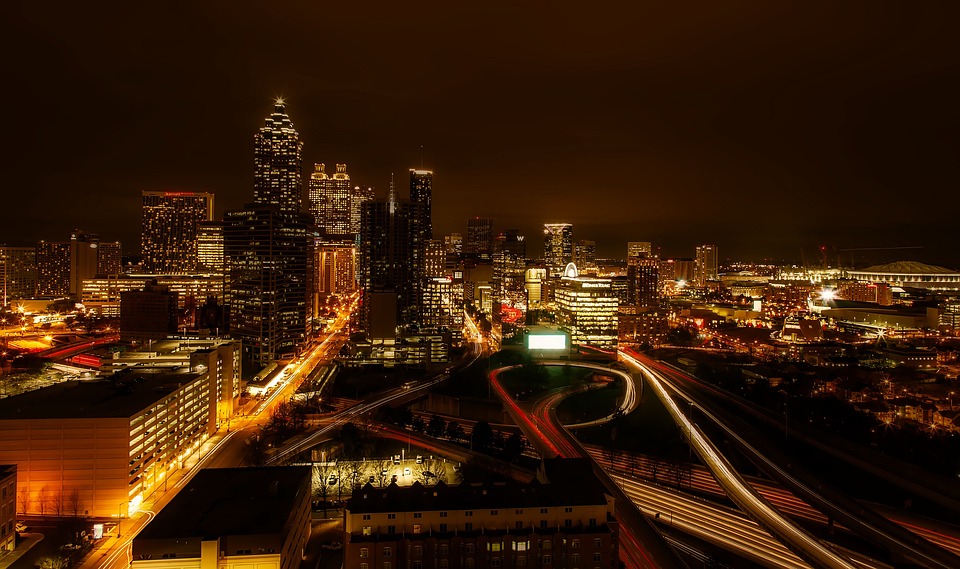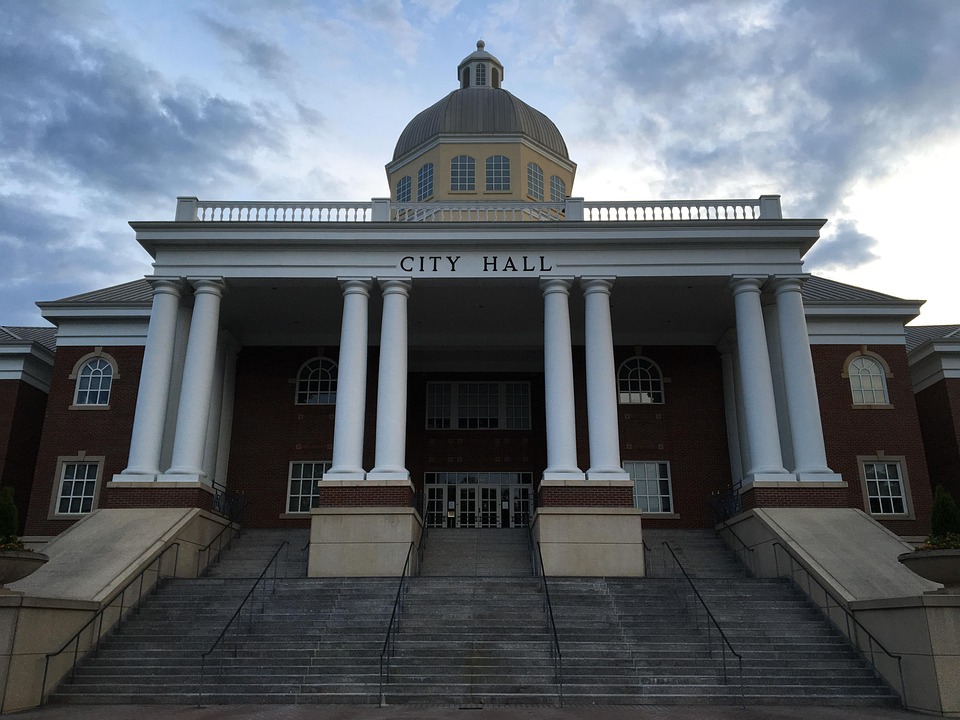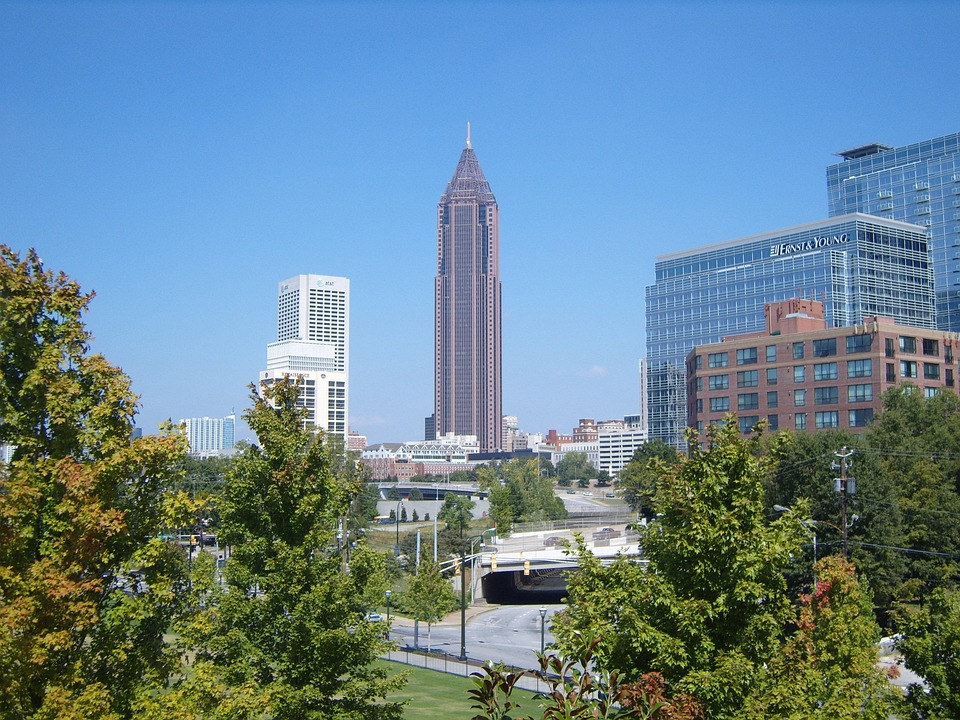Georgia state (USA)

Location
The state of Georgia is located in the southeastern United States, occupying an area bordered by five states: Florida to the south, Alabama to the west, Tennessee and North Carolina to the north, and South Carolina to the east. The state’s eastern boundary is washed by the Atlantic Ocean, creating excellent conditions for port development and tourism.
Georgia spans approximately 153,910 square kilometers, making it one of the largest states in the region by area.
The largest city and state capital is Atlanta, which serves as a key transportation, cultural, and business hub of the United States.
Other major cities include Savannah, Augusta, and Columbus.
The state is renowned for its diverse geographical features, encompassing coastal areas, the Appalachian mountain ranges, and extensive plains. This provides a variety of natural landscapes and opportunities for outdoor recreation.
Climate and Landscape
Georgia is known for its mild subtropical climate, offering comfortable conditions for living and recreation. Summers in the state are hot and humid, with average temperatures ranging from +27°C to +35°C. Winters, on the other hand, are mild and short, with temperatures around +5°C to +15°C. In northern areas, closer to the Appalachians, winters tend to be slightly cooler, while coastal zones are warmer. Frost and snow are rare, mostly occurring in mountainous regions.
Rainfall in Georgia is evenly distributed throughout the year, with the wettest months being April and August. During this period, short but intense downpours are common. The state is also part of the “Tornado Alley,” making strong storms and tornadoes possible in spring and summer. Additionally, the hurricane season, lasting from June to November, may affect coastal areas.
Landscape
Georgia’s terrain is remarkably diverse. The northern part of the state is occupied by the Appalachian Mountains, featuring scenic peaks, dense forests, and mountain rivers. The state’s highest point is Brasstown Bald, standing at 1,458 meters.
The central part of the state is the Piedmont Plateau, gradually transitioning into the southern plains. This region is known for its fertile soils, widely used in agriculture. The southern part of Georgia is a coastal lowland with numerous swamps, rivers, and beaches. One of the most famous natural landmarks of this region is the Okefenokee National Wildlife Refuge, one of the largest freshwater swamps in the United States.
The coastal zone also includes numerous barrier islands, attracting tourists with their beaches and pristine nature. Thanks to its geographical and climatic diversity, Georgia offers a rich selection of opportunities for outdoor activities and nature exploration.
Population
Georgia is the eighth most populous state in the United States. As of 2023, it is home to approximately 10.9 million people. The state capital, Atlanta, is the most densely populated city, with over 500,000 residents, while its metropolitan area is home to more than 6 million. Other major cities, such as Augusta, Columbus, and Savannah, have significantly smaller populations but remain important economic and cultural centers.
Ethnic Composition
Georgia is a multicultural state with the following major groups:
- White – approximately 50.1%;
- African American – about 32.6%;
- Hispanic or Latino – 10.6%;
- Asian – 4.4%;
- Other ethnic groups – 2.3%.
Atlanta is one of the most important centers of African American culture and history in the U.S., attracting tourists and researchers alike. Moreover, Georgia is renowned for its hospitality and friendly atmosphere, which fosters integration for immigrants from various parts of the world.
Population Density
The population density in Georgia is about 71 people per square kilometer, though it varies significantly by region. The Atlanta metropolitan area is the most densely populated, while rural areas in the southern and western parts of the state are less so.
Thanks to rapid economic growth and urban development, Georgia’s population continues to grow, driving increased demand for housing, jobs, and infrastructure.
Crime
The crime rate in Georgia is generally at an average level compared to other U.S. states. As of 2023, the state records approximately 340 violent crimes per 100,000 people, slightly below the national average. However, crime rates can vary significantly depending on the region.
Atlanta, the state’s largest city, has a higher crime rate compared to less populated areas. Crimes such as robberies, car thefts, and assaults are more common, especially in certain parts of the city. In contrast, smaller towns and rural areas have significantly lower crime rates.
Safest and Most Dangerous Areas
- Safest areas: Cities like Johns Creek, Milton, and Alpharetta are considered some of the safest places in Georgia, thanks to their high quality of life, low crime rates, and active law enforcement presence.
- More dangerous areas: Certain parts of Atlanta, such as the western and southern outskirts, as well as cities like Augusta and Columbus, have higher crime rates, particularly property crimes and violence.
Economy
Georgia’s economy is one of the most developed in the southern United States, ranking 9th in the country by GDP. As of 2023, the state’s economy is supported by several key industries, including agriculture, transportation, technology, film production, and tourism.
Atlanta, the largest city, serves as an economic hub and is home to the headquarters of major corporations such as Coca-Cola, Delta Air Lines, UPS, and Home Depot. The city also hosts one of the busiest airports in the world, Hartsfield-Jackson Atlanta International Airport, which significantly contributes to the state’s transportation sector.
Key Economic Sectors
- Agriculture: Georgia is a leading producer of peaches, peanuts, pecans, and poultry in the United States. Agricultural products are an important source of revenue for the state.
- Technology: The state has become a hub for financial technology (fintech), cybersecurity, and innovation, creating new jobs and attracting young professionals.
- Film Production: Georgia is a leader in U.S. film production thanks to favorable tax incentives. Numerous Hollywood movies and TV shows are filmed here, generating substantial income for the state.
- Tourism: With its rich history, culture, and natural attractions, Georgia draws millions of tourists every year.
Minimum Wage and Standard of Living
The minimum wage in Georgia is $7.25 per hour, aligning with the federal rate. Meanwhile, the median household income is approximately $65,000 per year. The poverty rate in the state is about 13%, slightly above the U.S. average.
The employment rate in Georgia remains stable, with a low unemployment rate of approximately 3.2% in 2023. This indicates the state’s strong economy and its ability to create new job opportunities.

Georgia for Business
Georgia offers favorable conditions for conducting business, making it one of the top states for entrepreneurship in the U.S. With its advantageous geographical location, robust transportation infrastructure, and business-friendly tax policies, the state attracts both large corporations and small startups.
Advantages of Doing Business in Georgia
- Tax Incentives: Georgia provides numerous tax breaks, especially for companies in technology, film production, and logistics industries.
- Transportation Network: With the world’s busiest airport, Hartsfield-Jackson Atlanta International Airport, an extensive network of highways, and the Port of Savannah – one of the largest cargo ports in the U.S. – Georgia is a logistical hub.
- Access to Talent: The state is home to top universities like Georgia Tech and the University of Georgia, ensuring a highly skilled workforce.
- Low Business Costs: Costs for rent, wages, and utilities are lower compared to other major U.S. economic hubs.
Disadvantages
However, there are challenges, such as:
- High Competition: Particularly in Atlanta, where most large companies are concentrated.
- Crime Levels in Certain Areas: This can affect the safety of employees and clients.
- Dependence on Transportation Networks: Despite its developed infrastructure, traffic congestion and other transport issues can be obstacles.
Real Estate
Georgia’s real estate market is one of the most dynamic in the southern United States. With relatively low prices and steady economic growth, the state attracts both local buyers and investors from other regions of the country. The Atlanta metropolitan area is the largest and most active real estate market in the state, though less populated areas are also experiencing increased demand.
Housing Prices
- Atlanta: The average home price in Atlanta in 2023 is approximately $400,000. The cost of renting a one-bedroom apartment ranges from $1,200 to $1,800 per month, depending on the neighborhood.
- Savannah and Augusta: Housing prices in these cities are significantly lower. The average home price is around $250,000, while rent ranges from $900 to $1,400 per month.
- Rural Areas: In less populated areas, real estate is more affordable, with the average home price starting at $150,000 and rent from $700 per month.
Investment Appeal
Georgia is an attractive market for investors due to low property taxes and high returns on investment in the housing sector. Additionally, population growth, urbanization, and infrastructure development drive increased housing demand.
Popular Areas
- Atlanta: Urban neighborhoods like Midtown and Buckhead are popular among young professionals due to their proximity to offices, restaurants, and entertainment venues.
- Suburbs: Cities like Alpharetta, Johns Creek, and Decatur attract families because of high-quality schools and safety.
- Coastal Regions: Savannah and neighboring towns are popular with those seeking a peaceful lifestyle near the ocean.
Ecology
With its rich natural heritage, including forests, rivers, mountains, and a coastline, Georgia holds great potential for ecotourism and sustainable development.
Environmental Challenges
- Air Pollution: Urban areas like Atlanta face problems with smog and increased emissions due to industrial growth, rising automobile use, and urbanization.
- Water Pollution: In rural areas, agricultural runoff often contaminates water bodies, which can affect the quality of drinking water.
- Soil Erosion: Intensive farming in agricultural regions makes soil erosion a pressing issue.
Landmarks
Georgia is renowned for its rich history, cultural heritage, and natural landscapes, attracting millions of tourists each year. From scenic beaches to historical sites, the state offers numerous points of interest for visitors.
Natural Attractions
- Okefenokee National Wildlife Refuge: One of the largest freshwater swamps in the U.S., home to alligators, rare birds, and unique flora.
- Blue Ridge Mountains: Part of the Appalachians, these mountains are popular for their scenic trails, waterfalls, and stunning mountain views.
- Golden Isles: Barrier islands featuring charming beaches, historic lighthouses, and luxurious resorts.
Historical Landmarks
- Savannah: Known for its colonial architecture, cobblestone streets, and Spanish moss-draped trees, Savannah is considered one of the most beautiful cities in the U.S.
- Martin Luther King Jr. National Historical Park: Located in Atlanta, visitors can explore the birthplace, church, and memorial of this iconic civil rights leader.
- Bonaventure Cemetery: Situated in Savannah, this is one of the world’s most famous cemeteries, known for its atmosphere and historical significance.
Cultural and Entertainment Spots
- Georgia Aquarium: One of the largest aquariums in the world, featuring whale sharks, dolphins, and other marine life.
- Atlanta Botanical Garden: A stunning garden showcasing extensive plant collections, sculptures, and themed exhibits.
- World of Coca-Cola: A museum in Atlanta dedicated to the history of one of the world’s most iconic brands.
Places for Outdoor Enthusiasts
- Stone Mountain Park: A park with a massive granite mountain, cable car rides, and family-friendly attractions.
- Providence Canyon: Often called the “Little Grand Canyon,” it’s perfect for hiking and enjoying nature.
- Lake Lanier: A popular spot for fishing, water sports, and camping.

Why People Move to Georgia
Georgia is one of the most popular states for relocation due to its economic opportunities, moderate climate, and high quality of life. People from across the U.S. and around the world choose Georgia for many reasons.
Reasons for Moving
- Economic Opportunities: The state boasts one of the most dynamic economies in the U.S., offering jobs in technology, film production, agribusiness, and logistics. Atlanta, as an economic hub, is particularly attractive to professionals and entrepreneurs.
- Moderate Climate: Georgia’s subtropical climate offers mild winters and long warm seasons, appealing to those looking to avoid harsh weather conditions.
- Affordable Housing: Compared to other economic centers like New York or Los Angeles, housing costs in Georgia are significantly lower.
- Cultural and Natural Diversity: Georgia offers a rich array of recreational activities, including cultural events in Atlanta, historic sites in Savannah, and natural attractions such as the Appalachian Mountains and the Atlantic coast.
- Developed Infrastructure: Modern roads, Atlanta’s international airport, and high-quality healthcare facilities make life comfortable in the state.
Advantages for Families
Georgia is a popular destination for families due to high-quality schools in the suburbs, safe neighborhoods, and numerous parks for outdoor activities. Cities like Alpharetta and Johns Creek, for example, are renowned as ideal places for raising children.
Challenges for Newcomers
- Traffic Problems: In large cities, especially Atlanta, traffic congestion can be inconvenient for residents.
- Climate Adaptation: High humidity in summer can be challenging for those accustomed to drier climates.
- Crime Rates: While Georgia’s overall safety is high, certain areas in major cities have elevated crime rates.
What Else Should You Know About Living in Georgia and for Newcomers?
Georgia, like any other state, has its unique features, laws, and social norms that are important for a comfortable life. Some of these may be interesting or even unusual for newcomers.
Interesting Facts
- The Peach State: Although Georgia is known as “The Peach State,” it actually ranks only third in peach production in the U.S. The state’s primary crops are peanuts and pecans.
- Cinematic Hub: Georgia is the “Hollywood of the South.” Over 200 movies and series are filmed here annually, including popular productions like The Walking Dead and The Avengers.
Quirky Laws
- Fork-Free Chicken Eating: In Gainesville, the “Poultry Capital of the World,” there is a law stating that chicken must be eaten only with your hands. While more of a humorous rule, it attracts tourists’ attention.
- Elephant Parking: It’s illegal to park an elephant in front of a store. This outdated law is still officially in place.
- Cemetery Parking: Strict rules exist regarding parking near cemeteries – only those with valid reasons can leave their vehicles in such areas.
Unwritten Rules
- Southern Hospitality: Locals are very friendly, which is part of the southern culture. Don’t be surprised if strangers smile or strike up a conversation with you.
- Respect for Traditions: In many communities, church events and family traditions play a significant role. Knowing local holidays and customs will help you integrate better.
- Patience on the Roads: In suburban areas, drivers often move slowly. It’s typical for Georgia, especially in rural areas, where people dislike rushing.
Practical Tips for Newcomers
- Adapting to the Climate: Adjusting to high humidity can take time. Ensure your home has a reliable air conditioning system.
- Transportation: In Georgia, especially outside Atlanta, it’s challenging to get by without a car. Public transportation is only well-developed in certain cities.
- Familiarize Yourself with Local Laws: For instance, alcohol sales are prohibited in many areas on Sundays until midday, which is important to keep in mind when shopping.
- Try Local Cuisine: Be sure to try regional dishes like biscuits and gravy, fried chicken, and barbecue.
Table of Contents